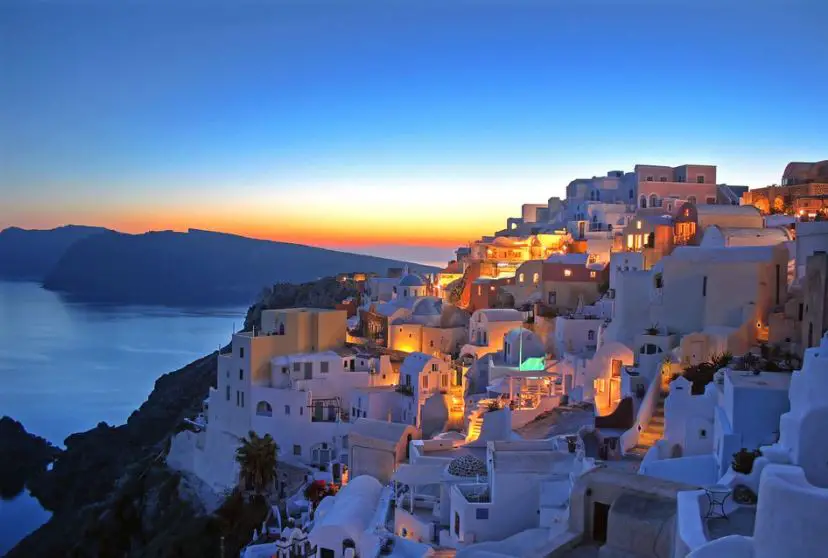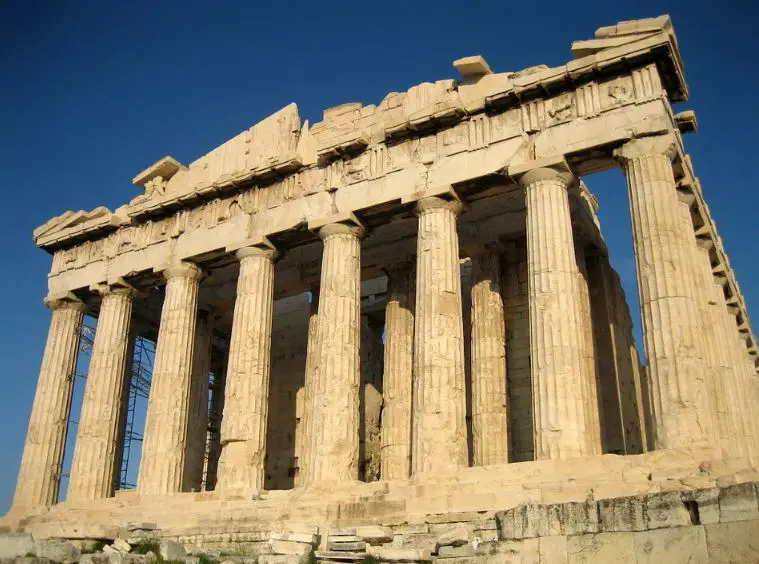Athens, Greece: Interesting Facts,History, Things to do,Why to Visit
Post ByAdequate Travel
Athens, the capital of Greece, is a city full of fascinating history and amazing experiences. A mecca of Western civilization, Athens is also well known for its mythology, art, and literature. Visiting this city is truly an unforgettable experience which will leave you with a lifetime of wonderful memories. Athens was the cradle of civilization, and to this day there are still many places to explore from its ancient ruins to its vibrant culture and cuisine. Visit the Parthenon and the city's many museums, explore the stunning cityscape of impressive architecture, and marvel at its unique history. In addition to sightseeing, Athens offers a myriad of activities to do in the city. Enjoy wine tasting, shop in the beautiful markets and ride the iconic cable car. In the evening, you can experience the nightlife in one of the city's many bars, clubs, and rooftop lounges. Athens is a must-see destination for anyone wanting to experience a bit of truly ancient history. Whether you come to explore its culture, relax on its beaches, or visit its historical sights, this city will leave a lasting impression.
Greece, officially known as the Hellenic Republic, is a southeastern European country located on the southern tip of the Balkan Peninsula. It has a rich historical and cultural heritage, with a significant influence on Western civilization due to its ancient Greek roots. Greece is known for its breathtaking landscapes, including beautiful islands such as Santorini and Mykonos, and iconic historical sites such as the Acropolis in Athens. The country has faced economic challenges in recent years, including a severe debt crisis, which has had significant impacts on its economy and led to austerity measures. However, Greece remains a popular tourist destination, attracting millions of visitors every year with its stunning beaches, delicious cuisine, and warm hospitality. Greece is also a member of the European Union and the United Nations, playing a role in regional and global affairs.Explore the popular places in greece, and immerse yourself in its vibrant culture.
Interesting facts
Greece: A Land of Ancient History and Mythology
Greece is a historically rich and culturally diverse country located in the southeastern part of Europe. Here are some interesting facts about Greece:
1. Birthplace of Democracy
Greece is known as the birthplace of democracy, a political system that allows all citizens to participate in decision-making. The ancient city-state of Athens introduced the concept of democracy around the 5th century BCE. This revolutionary idea laid the foundation for modern democratic governance systems. Examples include the Athenian democracy, where citizens could vote on laws and policies.
2. The Olympic Games
The Olympic Games, the world's most prestigious sporting event, originated in ancient Greece. The city-state of Olympia held the first recorded Olympic Games in 776 BCE. Initially, these games consisted of only one event: a short race. Over time, various athletic competitions were added, including wrestling, discus throwing, and chariot races. Today, the Olympic Games continue to bring nations together in friendly competition.
3. Magnificent Ancient Ruins
Greece is home to numerous ancient ruins that showcase its rich history and architectural marvels. The Acropolis, located in Athens, is a UNESCO World Heritage site and includes the iconic Parthenon, dedicated to the goddess Athena. Other remarkable sites include the Temple of Apollo in Delphi and the Palace of Knossos in Crete. These ruins provide a glimpse into the advanced civilizations that once thrived in Greece.
4. Mythology and Gods
Greek mythology has had a profound influence on Western culture. The ancient Greeks believed in a pantheon of gods and goddesses who influenced various aspects of life. Zeus, the king of the gods, ruled over Mount Olympus, while Hera was the queen and goddess of marriage. Legends like the labors of Hercules and the Trojan War are well-known tales that stem from Greek mythology.
5. Mediterranean Cuisine
Greece is famous for its delicious Mediterranean cuisine, which emphasizes fresh and seasonal ingredients. Classic Greek dishes include moussaka, souvlaki, tzatziki, and spanakopita. Olive oil, feta cheese, herbs, and seafood are prominent components of Greek cuisine. The Mediterranean diet, with its focus on plant-based foods and healthy fats, is associated with numerous health benefits.
In conclusion, Greece's historical significance, mythology, ancient ruins, and mouthwatering cuisine make it a captivating country to explore. The influence of ancient Greece continues to permeate various aspects of modern society, from politics to art to sports.From museums to parks,greece tourist attractions offer something for everyone, making it a versatile destination for all type of tourists.The Ancient History of Greece
Greece has a rich and storied history that dates back thousands of years. Throughout its ancient history, Greece experienced significant political, cultural, and intellectual developments. Here are some key points about ancient Greece:
1. The Birth of Democracy
Greece is often credited with the birth of democracy, as it was in Athens that the world's first democratic government was established around 508 BCE. This form of government allowed male citizens to participate in decision-making processes and shaped the future of governance around the world.
2. The Olympic Games
Greece introduced the Olympic Games, which were held every four years in Olympia, to celebrate athleticism and honor the gods. The first recorded games took place in 776 BCE, and the tradition continued for centuries, gaining widespread recognition and admiration.
3. Philosophy and Intellectual Advancements
Greece produced renowned philosophers who significantly influenced Western thought. Figures such as Socrates, Plato, and Aristotle explored concepts of ethics, politics, and metaphysics. Their philosophies laid the foundation for rational thinking and intellectual pursuits.
4. The Persian Wars
Greece faced invasions from the Persian Empire in the 5th century BCE. The Persian Wars, which included famous battles like Marathon and Thermopylae, resulted in Greek victories and established Greece as a symbol of resistance to foreign rule.
5. Alexander the Great
Alexander the Great, a Macedonian king, extended Greek influence across a vast empire, from Greece to Egypt and India, in the 4th century BCE. His military campaigns spread Greek culture, language, and architecture, an era known as the Hellenistic period.
6. Mythology and Gods
Greece has a rich mythology with numerous gods and goddesses. The Greek gods, including Zeus, Hera, Poseidon, and Athena, played significant roles in Greek society and were worshipped through elaborate rituals and festivities.
These are just a few highlights from the ancient history of Greece. The country's influence and achievements continue to resonate today, making it a captivating subject for study and exploration.Exploring the rich heritage of historical sites in greece is a journey through time and culture.Famous Things of Greece
1. Acropolis of Athens
The Acropolis of Athens is one of the most famous landmarks of Greece and a symbol of ancient Greek civilization. It is a hilltop citadel located in Athens and consists of various ancient buildings, including the iconic Parthenon. The Acropolis is recognized for its architectural beauty and historical significance.2. Olympic Games
The Olympic Games originated in ancient Greece and have become an internationally renowned sporting event. The ancient Olympic Games were held in Olympia and featured various athletic competitions. Today, the modern Olympic Games are held every four years, with athletes from around the world participating in various sports disciplines. Greece played a significant role in reviving the modern Olympic Games in 1896.3. Greek Mythology
Greek mythology is a rich collection of stories and legends that have had a lasting impact on Western literature and culture. It involves the gods and goddesses, heroes, and mythical creatures. Famous figures from Greek mythology include Zeus, Poseidon, Athena, Hercules, and Medusa. These captivating myths have been the inspiration for countless works of art, literature, and films.4. Delphi
Delphi was a religious sanctuary in ancient Greece and is known for being the center of the world according to Greek mythology. It was home to the Oracle of Delphi, a priestess who was believed to communicate with the gods and provide prophecies. Delphi attracted pilgrims from all over Greece who sought guidance and advice from the Oracle.5. Greek Cuisine
Greek cuisine is renowned for its delicious and healthy Mediterranean flavors. It features ingredients such as olive oil, feta cheese, fresh vegetables, lamb, and seafood. Popular Greek dishes include moussaka, souvlaki, tzatziki, dolmades, and baklava. Greek cuisine has influenced many other culinary traditions around the world.These famous aspects of Greece have played a significant role in shaping its culture, history, and global influence. The Acropolis showcases the architectural brilliance of ancient Greece, while the Olympic Games represent the spirit of competition and international unity. Greek mythology continues to captivate imaginations, and Delphi remains a symbol of spiritual significance. Finally, Greek cuisine delights food enthusiasts with its unique flavors and ingredients.Discover some unique facts about greece that will leave you amaze and intrigue.Culture of Greece
Greece has a rich and ancient culture that has greatly influenced the development of Western civilization. Its cultural heritage can be traced back to ancient times, encompassing a wide range of artistic, philosophical, and intellectual achievements. Here are some key aspects and examples of Greek culture:
1. Art and Architecture
Greek art and architecture are renowned for their aesthetic appeal and distinctive style. Examples include:
- The Parthenon, a magnificent temple dedicated to the goddess Athena, located on the Acropolis in Athens.
- The statue of Zeus at Olympia, one of the Seven Wonders of the Ancient World.
- The Discus Thrower (Discobolos), a famous sculpture depicting an athlete in motion.
2. Philosophy and Literature
Greece is considered the birthplace of philosophy, with influential thinkers like Socrates, Plato, and Aristotle shaping Western philosophical thought. Greek literature also holds a prominent place in world literature and includes classics such as:
- The Iliad and The Odyssey by Homer, epic poems that narrate the Trojan War and the adventures of Odysseus.
- Dramas by renowned playwrights like Aeschylus, Sophocles, and Euripides, such as Oedipus Rex.
- Dialogues by Plato, exploring philosophical ideas through Socratic questioning.
3. Mythology and Religion
Ancient Greek mythology and religion played a significant role in shaping the culture and worldview of the Greeks. Key gods and goddesses include:
- Zeus, the king of the gods and ruler of Mount Olympus.
- Athena, the goddess of wisdom and warfare.
- Aphrodite, the goddess of love and beauty.
4. Language and Literature
The Greek language holds a prominent position in the study of linguistics and has contributed numerous words and concepts to various languages. Notable Greek authors and poets include:
- Homer, the legendary poet who composed The Iliad and The Odyssey.
- Sappho, a female lyric poet known for her emotional and personal verses.
- Nikos Kazantzakis, a modern writer famous for his novel "Zorba the Greek."
5. Cuisine and Traditions
Greek cuisine is known for its use of fresh ingredients, olive oil, herbs, and flavorsome dishes. Traditional Greek foods include:
- Moussaka, a layered dish with eggplant, minced meat, and béchamel sauce.
- Souvlaki, skewered meat (usually pork or chicken) served with pita bread and tzatziki sauce.
- Dolmades, vine leaves stuffed with rice, herbs, and sometimes minced meat.
The Greek culture also has rich traditions, such as the celebration of Easter with religious processions, the lively dance style of Zorba, and the concept of philoxenia, which emphasizes hospitality and generosity towards guests.
Immerse yourself in the local culture by exploring greece's top-rated tourist attractions.Cuisine of Greece
Greek cuisine has a rich history and is known for its fresh ingredients, vibrant flavors, and Mediterranean influence. Traditional Greek dishes are often simple, using staple ingredients like olive oil, herbs, and cheese.
Key Characteristics of Greek Cuisine
1. Mediterranean Diet: Greek cuisine is based on the Mediterranean diet, which emphasizes the consumption of fresh fruits, vegetables, whole grains, legumes, and seafood.
2. Olive Oil: Olive oil is a fundamental ingredient in Greek cooking. It is used for cooking, dressing salads, and drizzling over dishes for added flavor.
3. Herbs and Spices: Greek cuisine relies heavily on herbs like oregano, thyme, mint, and dill, which give dishes a distinct aroma and taste. Common spices include garlic, cinnamon, and cloves.
4. Cheese: Feta cheese is a staple in Greek cuisine and is used in various dishes, salads, and pastries. Other popular cheeses include kefalotyri, graviera, and myzithra.
5. Seafood: Greece's extensive coastline makes seafood a prominent part of its cuisine. Grilled fish, octopus, calamari, and shrimp are popular choices.
6. Meat: Lamb and pork are commonly consumed meats in Greece. Common preparations include souvlaki (skewered and grilled meat) and moussaka (a layered dish with minced meat and eggplants).
7. Bakery and Pastries: Greek cuisine offers a wide variety of bread, pastries, and desserts. Examples include spanakopita (spinach and feta pie), tiropita (cheese pie), and baklava (sweet pastry with nuts and honey).
Examples of Greek Dishes
1. Moussaka: A layered dish made with eggplant, minced meat, potatoes, and béchamel sauce.
2. Souvlaki: Skewers of marinated meat (often pork or chicken) that are grilled and served with pita bread and tzatziki sauce.
3. Horiatiki Salad: Also known as Greek salad, it typically includes tomatoes, cucumbers, onions, olives, and feta cheese, dressed with olive oil and vinegar.
4. Spanakopita: A savory pie filled with spinach, feta cheese, onions, and herbs, wrapped in filo pastry.
5. Dolmades: Grape leaves stuffed with a mixture of rice, herbs, and sometimes meat, served as an appetizer or part of a main course.
6. Baklava: Layers of filo pastry filled with a sweet mixture of nuts (often walnuts or almonds) and drizzled with honey or syrup.
Greek cuisine offers a wide range of flavors and dishes that showcase the country's rich culinary traditions. From comforting moussaka to succulent souvlaki, each dish brings a unique combination of fresh ingredients, aromatic herbs, and the unmistakable taste of olive oil. Whether you enjoy seafood, meat, or vegetarian options, Greek cuisine has something to offer for every palate.Discover unique facts about greece, a destination filled with rich history and natural beauty.1. Visit the Acropolis in Athens
The Acropolis is a famous ancient citadel located on a rocky outcrop above the city of Athens. It is home to several iconic ancient Greek structures, such as the Parthenon, Temple of Athena Nike, and Erechtheion. Exploring the Acropolis offers a glimpse into the rich history and architectural achievements of the ancient Greeks.
Example:- Marvel at the stunning Parthenon, a temple dedicated to the goddess Athena.
- Admire the intricate carvings and design of the Temple of Athena Nike.
- Explore the Erechtheion, an ancient temple complex known for its unique design and Caryatid statues.
2. Relax on the Gorgeous Beaches of Crete
Crete, the largest Greek island, is known for its beautiful sandy beaches and crystal-clear waters. Whether you prefer a bustling beach with water sports and amenities or a secluded cove, Crete has plenty to offer. The island provides opportunities for swimming, sunbathing, snorkeling, and even some thrilling water activities like jet skiing.
Example:- Visit the world-renowned Balos Beach with its stunning azure waters and pink sand.
- Enjoy the picturesque scenery of Elafonisi, known for its shallow, turquoise lagoons.
- Relax on the lively and vibrant beaches of Malia or Hersonissos, popular among young travelers.
3. Explore the Ancient Ruins of Delphi
Delphi was once considered the center of the world in ancient Greek mythology and history. It is home to the famous Oracle of Delphi and was a significant religious and cultural site. Exploring the ancient ruins of Delphi allows you to immerse yourself in the fascinating ancient Greek civilization.
Example:- Visit the Temple of Apollo, where the Oracle of Delphi, a female priestess, delivered prophecies.
- Explore the Ancient Theater of Delphi, known for its stunning panoramic views of the surrounding landscape.
- See the Delphi Archaeological Museum, which houses a collection of artifacts from the site.
4. Cruise the Greek Islands
Embarking on a cruise around the Greek Islands is a popular way to experience the country's beauty. You can visit multiple islands, each with its unique charm, picturesque landscapes, and cultural attractions. Swim in hidden bays, indulge in delicious Greek cuisine, and witness breathtaking sunsets over the Aegean Sea.
Example:- Explore the island of Santorini and its famous picturesque white-washed buildings and vibrant sunsets.
- Visit the party island of Mykonos, known for its lively nightlife and stunning beaches.
- Discover the historical island of Rhodes, with its medieval Old Town and ancient ruins.
5. Discover the History in Thessaloniki
Thessaloniki is Greece's second-largest city and offers a balance of history, culture, and modern amenities. It is renowned for its Byzantine and Ottoman-era monuments, lively food scene, and vibrant nightlife.
Example:- Visit the White Tower, an iconic symbol of the city and a museum showcasing Thessaloniki's history.
- Explore the Rotunda, originally built as a mausoleum but later converted into a church and then a mosque.
- Wander through the Archaeological Museum of Thessaloniki, home to a vast collection of artifacts.
When planning your trip to greece, be sure to include the best things to do in greece, which encompass a wide range of cultural experiences.Climate of Greece
The climate of Greece can be classified as Mediterranean, characterized by hot, dry summers and mild, wet winters. However, due to its diverse geography, there are variations in climate across different regions of the country.
1. Mediterranean Climate
The majority of Greece experiences a Mediterranean climate, which is typified by long, hot, and dry summers, and mild, wet winters. In summer, temperatures can often soar above 30 degrees Celsius (86 degrees Fahrenheit), with little rainfall and abundant sunshine. The dry conditions are a result of the dominant high-pressure system over the Mediterranean region.
An example of this Mediterranean climate can be found in Athens, the capital of Greece. Summers are hot, with average temperatures around 32 degrees Celsius (90 degrees Fahrenheit), while winters are mild, with average temperatures around 10 degrees Celsius (50 degrees Fahrenheit).
2. Alpine Climate
In some mountainous regions of Greece, an alpine climate is present. These areas, such as the Pindus Mountain range, experience cooler temperatures compared to the coastal regions. Winters are snowy and cold, while summers are mild and pleasant. Rainfall is generally higher in these areas throughout the year.
For example, the mountainous region of Metsovo in northern Greece experiences an alpine climate. During winter, average temperatures drop below freezing, and heavy snowfall is common. Summers are cool, with average temperatures around 20 degrees Celsius (68 degrees Fahrenheit).
3. Semi-arid Climate
In some parts of Greece, particularly in the southeastern region of Attica, a semi-arid climate is observed. Summers are hot and dry, while winters are mild with limited rainfall. These areas often face drought conditions, especially during summer months.
An example of this semi-arid climate can be found in Lavrio, a coastal town in Attica. Summers are hot, with temperatures reaching around 30 degrees Celsius (86 degrees Fahrenheit), and rainfall is scarce. Winters are mild, with temperatures around 12 degrees Celsius (54 degrees Fahrenheit).
4. Continental Climate
In northern Greece and parts of the mainland, a continental climate is encountered. This type of climate is characterized by hot summers and cold winters, with significant temperature fluctuations throughout the year. Precipitation is generally well-distributed across the seasons.
Thessaloniki, the second-largest city in Greece, experiences a continental climate. Summers are hot and dry, with temperatures averaging around 32 degrees Celsius (90 degrees Fahrenheit). Winters are cold, with temperatures dropping below freezing and occasional snowfall.
In conclusion, the climate of Greece is predominantly Mediterranean with variations in different regions. This diversity offers a range of weather conditions, allowing visitors to enjoy both summer beach vacations and winter mountain activities.Discover the untold stories behind greece unique facts, and historical treasures.Popular Activities in Greece
1. Exploring Historical Sites
Greece is known for its rich history and ancient ruins. Visitors can explore iconic sites like the Acropolis in Athens, the Palace of Knossos in Crete, and the Temple of Apollo in Delphi.
Example: The Acropolis is an ancient citadel located on a rocky outcrop above Athens. It is home to the famous Parthenon, an iconic temple dedicated to the goddess Athena.
2. Relaxing on the Beaches
Greece is famous for its stunning beaches with crystal-clear waters and golden sand. Visitors can enjoy sunbathing, swimming, and water sports activities on the popular beaches in islands like Mykonos, Santorini, and Zakynthos.
Example: Mykonos is known for its vibrant beach clubs, such as Paradise Beach and Super Paradise Beach, where visitors can sunbathe, enjoy cocktails, and dance to lively music.
3. Island Hopping
Greece is comprised of thousands of islands, offering endless opportunities for island hopping. Visitors can explore multiple islands, each with its own unique charm, culture, and landscapes.
Example: Santorini, known for its picturesque white and blue buildings overlooking the Aegean Sea, is a popular destination for island hopping. Visitors can also explore other nearby islands like Naxos or Paros.
4. Trying Greek Cuisine
Greek cuisine is renowned worldwide for its fresh ingredients, delicious flavors, and healthy Mediterranean diet. Visitors can try traditional dishes like moussaka, souvlaki, tzatziki, and enjoy local wines and olive oil.
Example: In Athens, visitors can taste authentic Greek street food at the vibrant Monastiraki neighborhood, which offers a wide variety of souvlaki, gyros, and other Greek delights.
5. Hiking and Outdoor Activities
Greece boasts beautiful landscapes, mountains, and trails, making it an ideal destination for outdoor enthusiasts. Visitors can go hiking, mountain biking, or even rock climbing in locations like Mount Olympus, the Vikos Gorge, or the Samaria Gorge in Crete.
Example: The Samaria Gorge is one of the longest canyons in Europe and offers a challenging hike through stunning natural scenery, including rare flora and fauna.
Plan your trip with a list of the best things to do in greece, catering to all interests.Nightlife in Greece
Greece offers a vibrant and diverse nightlife scene, with bustling bars, nightclubs, and entertainment venues spread across its popular tourist destinations. Here are some key highlights of the nightlife in Greece:
1. Athens:
Athens, the capital city of Greece, is known for its energetic nightlife. The city has a wide range of bars, clubs, and restaurants that cater to all tastes and preferences. Popular areas for nightlife in Athens include the neighborhoods of Psiri, Gazi, and Kolonaki.
Example: "Baba Au Rum" is a renowned bar in Athens that offers a cozy and sophisticated atmosphere, serving a wide range of cocktails and spirits.
2. Mykonos:
Mykonos is one of Greece's most famous party destinations, attracting both international celebrities and partygoers from around the world. The island is known for its beach clubs, extravagant nightclubs, and lively summer parties.
Example: "Paradise Beach Club" is a popular beach club in Mykonos, known for its vibrant atmosphere, international DJs, and beachside party vibe.
3. Santorini:
Santorini, with its stunning caldera views and charming villages, also offers a vibrant nightlife experience. The island features a variety of bars and clubs, ranging from stylish rooftop bars to beachfront venues.
Example: "Koo Club" is a well-known nightclub in Santorini, known for its stunning location, top-notch DJs, and energetic party scene.
4. Thessaloniki:
Thessaloniki, Greece's second-largest city, has a lively and eclectic nightlife. The city offers a mix of traditional Greek taverns, trendy bars, and vibrant nightclubs.
Example: "The Caravan" is a popular bar in Thessaloniki, known for its unique ambiance, live music performances, and a wide selection of craft beers.
5. Rhodes:
Rhodes, known for its rich history and medieval architecture, also has a vibrant nightlife scene. Visitors can enjoy a mix of beachfront clubs, rooftop bars, and traditional taverns.
Example: "Colorado Club" is a beach club in Rhodes, offering a relaxed atmosphere, delicious cocktails, and regular themed parties.
In conclusion, Greece offers a dynamic and exciting nightlife experience with each destination showcasing its unique charm and atmosphere. Whether you prefer a glamorous party scene, cozy bars, or traditional taverns, Greece has something to offer for every taste.Exploring the city's diverse neighborhoods is one of the best ways to discover the best greece attractions, each with its own character and charm.Reasons to Visit Greece
Greece is a popular tourist destination for a multitude of reasons. Here are some of the main attractions and experiences that make Greece a must-visit country:
Fascinating History and Archaeological Sites
Greece is home to some of the most significant historical and archaeological sites in the world. From the magnificent Acropolis in Athens to the ancient ruins of Delphi and Olympia, Greece offers a rich cultural experience for history enthusiasts.
Example: The Acropolis is an iconic ancient citadel located on a rocky outcrop above Athens. It houses several ancient buildings, including the famous Parthenon, which is an exquisite example of classical Greek architecture.
Breathtaking Natural Beauty
Greece boasts stunning landscapes and natural wonders. From its countless picturesque islands to its rugged mountains and crystal-clear waters, there is no shortage of beauty to behold.
Example: Santorini, a volcanic island in the Cyclades, offers breathtaking views of white-washed buildings against the backdrop of the Aegean Sea. The island's unique volcanic beaches and mesmerizing sunsets make it a favorite among travelers.
Delicious Greek Cuisine
Greek food is renowned worldwide for its flavors, freshness, and variety. A visit to Greece means indulging in delicious Mediterranean cuisine, including moussaka, souvlaki, tzatziki, and baklava, among many other mouth-watering dishes.
Example: Souvlaki is a popular Greek street food that consists of grilled meat (usually pork or chicken) skewered with vegetables and served in a pita wrap with tzatziki sauce. The combination of tender meat, fresh vegetables, and tangy sauce is a delight for the taste buds.
Breathtaking Beaches and Islands
Greece offers an abundance of idyllic beaches and islands to satisfy any beach lover's desires. Whether you prefer secluded coves, bustling resort towns, or vibrant party beaches, Greece has it all.
Example: Mykonos is a world-famous party island known for its stunning beaches and vibrant nightlife. Paradise Beach, in particular, attracts tourists with its golden sand, clear blue waters, and beachside clubs that come alive after sunset.
Hospitality and Warmth of the Greek People
Greeks are known for their warm hospitality and friendly nature. Visitors to Greece often comment on the welcoming atmosphere and the genuine kindness of the locals.
Example: While exploring the winding streets of the Plaka neighborhood in Athens, you might come across a small taverna where the owners will happily engage in conversation, provide recommendations, and make you feel like part of their extended family.
Overall, Greece offers a remarkable blend of history, natural beauty, gastronomy, stunning beaches, and warm hospitality, making it a top choice for travelers from around the world.Whether you're a history buff or an adventure seeker, greece has an attraction for you. So, don't miss the chance to visit popular places in greeceNumber of days required to visit Greece
When planning a trip to Greece, the number of days required to fully explore the country depends on various factors such as your travel preferences, budget, and the specific destinations you want to visit. However, to get a comprehensive experience of Greece, a duration of 10-14 days is generally recommended.
Factors determining the number of days:
1. Destinations: The number of days needed largely depends on the number of destinations you wish to cover. If you plan to visit Athens, Santorini, Mykonos, and Crete, spending at least 2-3 days in each place would be ideal. This allows you to explore the main attractions, soak in the local culture, and have some leisure time.
2. Travel pace: Some travelers prefer a fast-paced trip with packed itineraries, while others prefer a more relaxed and slower exploration. If you prefer to take your time, enjoy the local ambiance, and savor the experiences, you may need more days at each destination.
3. Island hopping: Greece is famous for its beautiful islands. If you plan to include island hopping in your itinerary, you need to consider the ferry schedules and travel time between islands. This might require additional days for transportation and exploring multiple islands.
4. Activities and sightseeing: Greece offers a wide range of activities and sightseeing options, such as visiting ancient ruins, exploring museums, enjoying water sports, or simply relaxing on beaches. The more activities and attractions you wish to experience, the more days you will need to allocate for each destination.
Example itinerary for a 10-14 days trip:
Day 1-3: Athens - Explore the historical sites including the Acropolis, visit museums, and experience the vibrant city life.
Day 4-6: Santorini - Enjoy the stunning sunsets, explore the unique villages like Oia and Fira, and relax on the breathtaking beaches.
Day 7-9: Mykonos - Experience the vibrant nightlife, visit the famous windmills, and indulge in water sports activities.
Day 10-14: Crete - Explore the ancient ruins of Knossos, hike through the Samaria Gorge, and enjoy the picturesque landscapes.
Remember, this is just an example and can be customized based on your preferences. It is always a good idea to allow some flexibility in your itinerary to make room for unplanned experiences and relaxation. Additionally, if you have more time available, you can extend your stay in each destination or consider adding more places to explore.
Exploring the city's diverse neighborhoods is one of the best ways to discover the best greece attractions, each with its own character and charm.Significance of Greece
Greece holds immense significance in terms of history, culture, and its contributions to various fields. Here are some key points that highlight its importance:
1. Birthplace of Democracy
Greece is widely regarded as the birthplace of democracy. The concept of democracy, which allows citizens to participate in decision-making, originated in ancient Athens. This idea of governance has influenced political systems all over the world.
2. Cradle of Western Civilization
Greece is often referred to as the cradle of Western civilization due to its impact on philosophy, literature, art, and science. Ancient Greek philosophers like Socrates, Plato, and Aristotle laid the groundwork for Western philosophy, while Greek playwrights like Sophocles and Euripides shaped the world of theater. Greek mathematicians, such as Pythagoras and Euclid, made significant contributions to the field of mathematics.
3. Mythology and Literature
Greek mythology has had a profound influence on art, literature, and popular culture. The epic poems of Homer, such as the Iliad and the Odyssey, are considered among the greatest works of ancient literature. These stories continue to inspire and captivate audiences to this day.
4. Architectural Marvels
Greek architecture is renowned for its enduring beauty and innovation. The ancient Greeks developed styles such as the Doric, Ionic, and Corinthian orders, which continue to inspire architectural designs globally. Iconic structures like the Parthenon in Athens exemplify the exceptional skill and creativity of ancient Greek architects.
5. Olympic Games
Greece is the birthplace of the Olympic Games, an event with immense historical and cultural significance. The ancient Olympics were held in Olympia and were dedicated to the Greek gods. The modern Olympic Games, which promote international unity and excellence in sports, were revived in Athens in 1896 and continue to be celebrated every four years.
6. Cultural & Culinary Traditions
Greece has a rich and vibrant cultural heritage that is embedded in its traditions, festivals, music, and dance. Greek cuisine is renowned for its Mediterranean flavors and healthy ingredients, including olive oil, feta cheese, and fresh seafood. Greek cuisine has influenced various culinary cultures around the world.
In conclusion, Greece's significance lies in its contributions to democracy, its role as the cradle of Western civilization, its influential mythology, architectural marvels, the origin of the Olympic Games, and its cultural and culinary traditions. Greece's historical and cultural impact continues to shape various aspects of our modern world.From hidden gems to iconic landmarks, greece has something for every traveler's taste.FAQs of Greece
1. What is the currency of Greece?
The currency of Greece is the Euro (€). It is used for all financial transactions within the country.
2. What is the official language of Greece?
The official language of Greece is Greek. It is spoken by the majority of the population and is also the language used in government, media, and education.
3. What is the best time to visit Greece?
The best time to visit Greece is during the spring (April to June) and autumn (September to October) months. The weather during these seasons is pleasant, and the tourist crowds are not as overwhelming as in the summer. It is recommended to avoid the peak tourist season in July and August as it can be extremely hot and crowded.
4. What are the must-visit tourist attractions in Greece?
Some of the must-visit tourist attractions in Greece include:
- The Acropolis in Athens, which includes the iconic Parthenon
- Santorini, known for its beautiful sunsets and stunning views
- Delphi, home to the ancient ruins and the Oracle of Delphi
- The Island of Crete, known for its rich history and beautiful beaches
- Meteora, famous for its monasteries built on top of towering rock formations
5. Do I need a visa to visit Greece?
If you are a citizen of a country within the Schengen Area, you do not need a visa to visit Greece for tourist purposes. However, if you are from a non-Schengen country, you may need to obtain a visa before your trip. It is recommended to check the visa requirements based on your nationality before planning your visit.
6. What is the local cuisine like in Greece?
Greek cuisine is known for its delicious and healthy Mediterranean flavors. Some popular Greek dishes include:
- Moussaka - a layered dish with eggplant or potatoes, ground meat, and béchamel sauce
- Souvlaki - grilled skewers of meat (usually pork or chicken) served with pita bread and tzatziki sauce
- Greek salad - a refreshing salad with tomatoes, cucumber, red onion, feta cheese, olives, and olive oil
- Spanakopita - a savory pastry filled with spinach, feta cheese, and herbs
- Baklava - a sweet pastry layered with nuts and honey syrup














